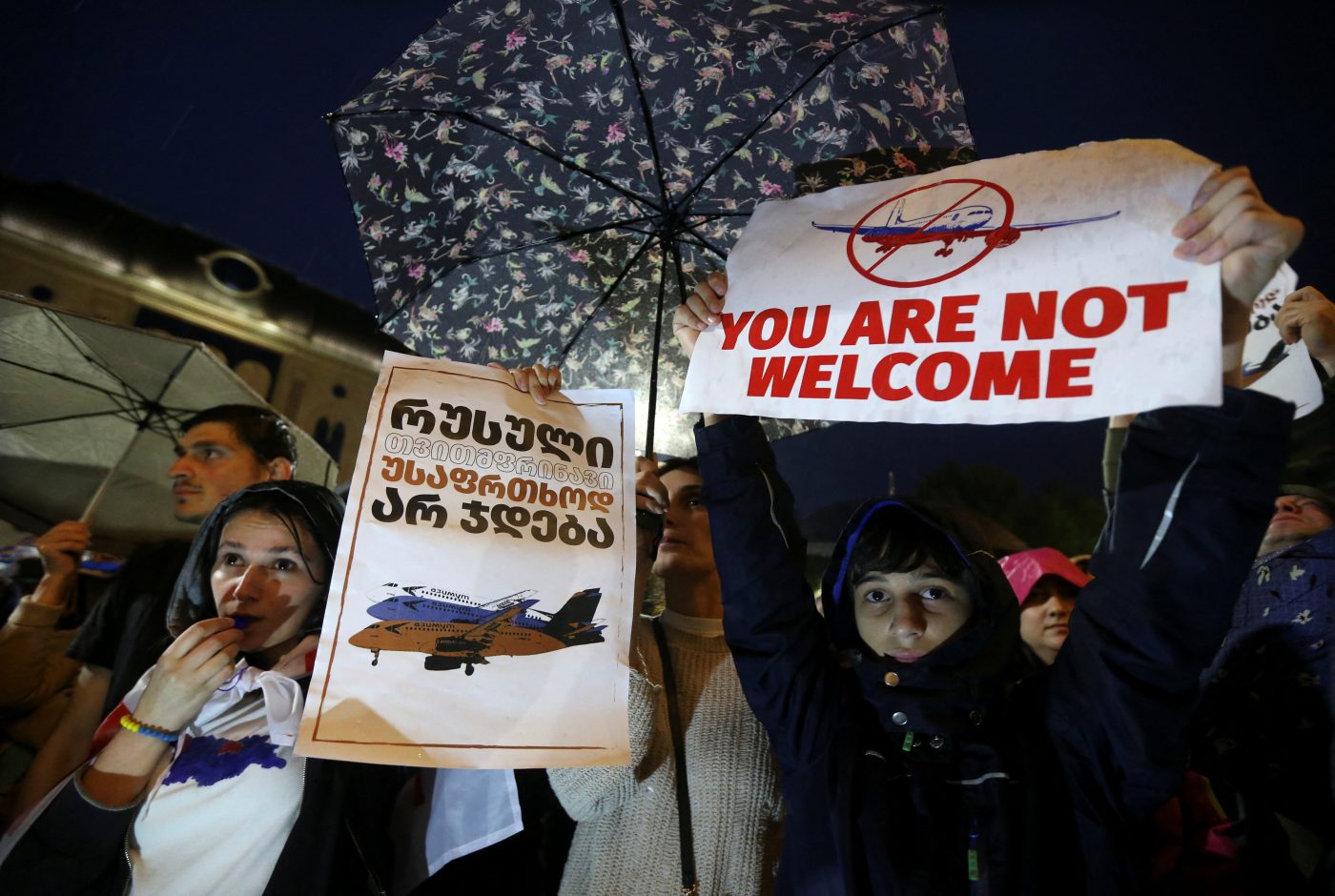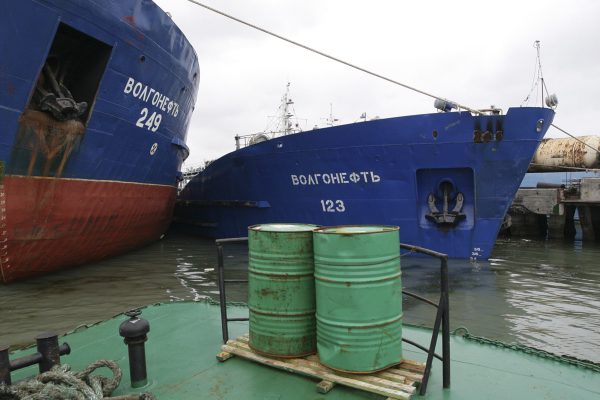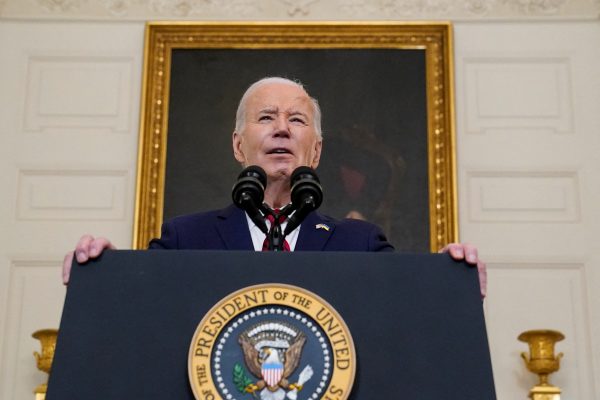The burgeoning discord is not just apparent from political rhetoric, but palpable in everyday interactions.
Georgia, which has just achieved European Union (EU) candidate status, stands at a key juncture. The influx of more than a million Russians, a changing demographic landscape, and the resultant societal reactions show a nation grappling with its identity, economic interests, and geopolitical alignment.
In a manifestation of the national mood, a growing number of Georgian businesses are openly refusing service to Russian citizens. Some establishments have taken a more overt stance, incorporating anti-Russian messages into their daily operations, such as “Russia is an occupier” as a Wi-Fi password, or refusing to communicate or provide services in Russian language.
This trend underscores a deepening societal divide, where nationalist fervor is clashing with principles of hospitality and economic pragmatism. The reaction from some Russians has been notably aggressive, resorting to cyberattacks and coordinated negative reviews on social media.
These actions aim to tarnish the reputation of businesses taking a stand, reflecting a new frontier where digital tools are wielded as weapons. The digital confrontation is a microcosm of broader geopolitical tensions, where cyberspace becomes a battleground for nationalistic and political disputes.
Many Russians who moved to Georgia after the full-scale invasion of Ukraine in February 2022 are now leaving due to increased hostility and difficulties obtaining residence permits.
The number of Russians crossing into Georgia soared to more than 1.45 million in 2022, compared to just under 300,000 the previous year, according to the Ministry of Internal Affairs. This is a huge number given that the Georgian population is just 3.6 million.
The surge, primarily composed of young, educated, and employed individuals, particularly from the IT sector, was motivated by factors ranging from Russia’s political climate (87%), the conflict in Ukraine (73%), and the announcement of “partial” mobilization (29%), surveys found.
Georgia’s visa-free policy, allowing Russian citizens to stay for up to a year, has been pivotal. Migration was further fueled by the reinstatement of direct flights between Russia and Georgia in May 2023.
In the 13 months from March 1, 2022, 10,004 Russian citizens also applied for residence permits in Georgia. Some 58% of applications (5,838) were approved, while 34% (3,415) were rejected. The rate of rejection has been rising, with a jump to 41% in 2023 from 31% the previous year.
Opposition to the influx has been growing. A March 2023 poll found 79% of Georgians opposed visa-free entry and allowing Russians to register businesses or buy property.
The arrival of so many people from its neighbor has left a significant imprint on Georgia’s economy, particularly the real estate and banking sectors. In cities like Tbilisi and Batumi, there’s been a marked increase in property transactions and bank deposits by Russian nationals.
As a result, NGOs and opposition parties have called for stricter measures against Russian citizens and interests. LELO, an opposition party, proposed a “Georgia Protection Act” to restrict Russian activities in Georgia.
The proposed legislation sought to impose visa restrictions, limits on property ownership, and an end to direct flights from Russia among other measures. It was rejected by parliament after objections from the budget office.
Since the full-scale invasion of Ukraine, Georgian Dream, the ruling party, has maintained its open-door policy to Russian citizens and emphasized the economic benefits of direct flights. The reopening of the air route, with the blessing of former Prime Minister Irakli Gharibashvili, was met with protests, and opposition from President Salome Zurabishvili, who said it was a provocation by her Russian counterpart Vladimir Putin.
Georgian Dream’s approach to Moscow, bolstered by economic dependence on links with Russia, is at odds with the Western outlook of the population. A poll published in December showed 79% support EU membership while a majority also back joining NATO. Meanwhile, 62% are disillusioned with politicians and say none of the political parties represent their interests.
Georgia’s immigration policy, particularly toward Russian nationals, is evolving. While the government claims entry bans for Russian activists and journalists aren’t politically motivated, a pattern has emerged of denying entry to anti-Putin figures like lawyer Anna Rivina and writer and journalist Filipp Dzyadko (Georgia has been a destination for many activists from Russia for years.)
As Georgia advances towards EU membership, its immigration rules are expected to align more with bloc standards, possibly leading to stricter entry requirements and a reassessment of its visa-free agreement with Moscow.
Georgia’s path forward is less than clear, given the government maintains “pragmatic” politics towards a Kremlin that is adamantly opposed to its EU and NATO aspirations, and clearly uses its soft power to spread anti-Western (EU, NATO, US) sentiments in Georgia.
Tbilisi must balance the changing dynamics of Russian immigration, rising nationalist sentiment, and economic considerations with key EU requirements, including combating disinformation and alignment with Brussels’s common foreign and security policy.
As it fulfills the necessary steps toward EU negotiations, Georgia must navigate with strategic foresight. It will have to watch particularly for a repeat of Russia’s tactic of using the “protection” of its citizens abroad as a pretext for military intervention.
That danger looms as a potential geopolitical threat, especially in a country where Russia already illegally occupies 20% of its land. Georgia’s decisions will not only shape its domestic landscape but also signal its trajectory in a rapidly changing world.
Ketevan Chachava is a democracy and civil activist from Georgia and serves as a Steering Committee member of the World Movement for Democracy. With over 18 years of civil sector experience, she held management roles in local and international NGOs, including as Director of the Information Center on NATO and EU from 2016-2017. Ketevan holds a Postgraduate Diploma in Strategic Communications from Kings College London.
Natia Zoidze is a human rights lawyer who focuses on issues at the intersection of democratization and social justice. With an LLM in Human Rights Law from Queen Mary University of London, she actively champions democratic values and human rights. She is Deputy Executive Director at the Center for Development and Democracy, a prominent Georgian NGO.
Europe’s Edge is CEPA’s online journal covering critical topics on the foreign policy docket across Europe and North America. All opinions are those of the author and do not necessarily represent the position or views of the institutions they represent or the Center for European Policy Analysis.





